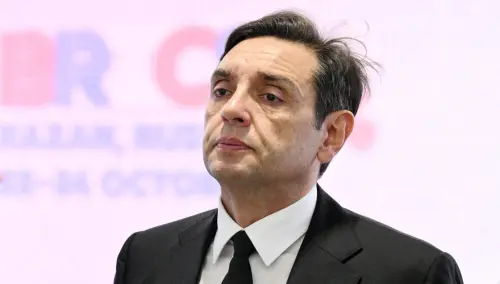BELGRADE, Feb 28 (Reuters) – Following a meeting with Russia's spy chief in Moscow, Serbia's deputy prime minister accused Western intelligence agencies on Friday of attempting to destabilize the country through their support of months of anti-government protests.
Deputy Premier Aleksandar Vulin, in a statement after his meeting with Sergei Naryshkin, director of Russia's Foreign Intelligence Service (SVR), alleged that Western powers were orchestrating efforts to overthrow Serbia's government, which has had longstanding ties with Moscow.
Vulin's office stated, "Western intelligence services are endeavoring to orchestrate a 'colour revolution' and destabilize the Republic of Serbia," alluding to the 2014 pro-European uprising in Ukraine that led to the ousting of a pro-Russian president.
Since November last year, tens of thousands of students, along with teachers, farmers, and workers, have been staging daily protests following a roof collapse at a train station in the northern city of Novi Sad that resulted in 15 fatalities.
The protests have become a significant challenge to President Aleksandar Vucic's decade-long hold on power as many Serbs attribute the tragedy to corruption within the government.
Vulin, a vocal pro-Russian politician, previously held positions as the head of Serbia's Security and Information Agency (BIA), as well as the interior and defense minister.
He leads the Movement of Socialists, a minor party in Serbia's ruling coalition that supports Vucic, a populist leader.
In 2023, Vulin was sanctioned by the United States for alleged involvement in "malign" Russian activities, as well as suspected ties to an arms dealer and a drug trafficking operation, leading to his removal from BIA.
Maintaining close relations with Russian intelligence agencies, Vulin was decorated in 2024 by both President Vladimir Putin and Alexander Bortnikov, head of the Federal Security Service (FSB).
Vulin's statement also implicated Western interests in sanctions against Serbia's NIS oil industry, predominantly owned by Russia's Gazprom.
"The sanctions targeting NIS are part of a hybrid war...aimed at overthrowing President Vucic and the legitimately elected government," the statement highlighted, without providing further details.
Belgrade finds itself treading a fine line between its desire to join the European Union and its close ties to Russia, a traditional and influential ally of the Serbian people.
Despite condemning Russia's actions in 2022, Belgrade has refrained from partaking in international sanctions against Moscow to date.
For Serbia to pursue EU membership, it would need to address issues of state corruption, organized crime, and align its foreign policies with those of the EU bloc.
